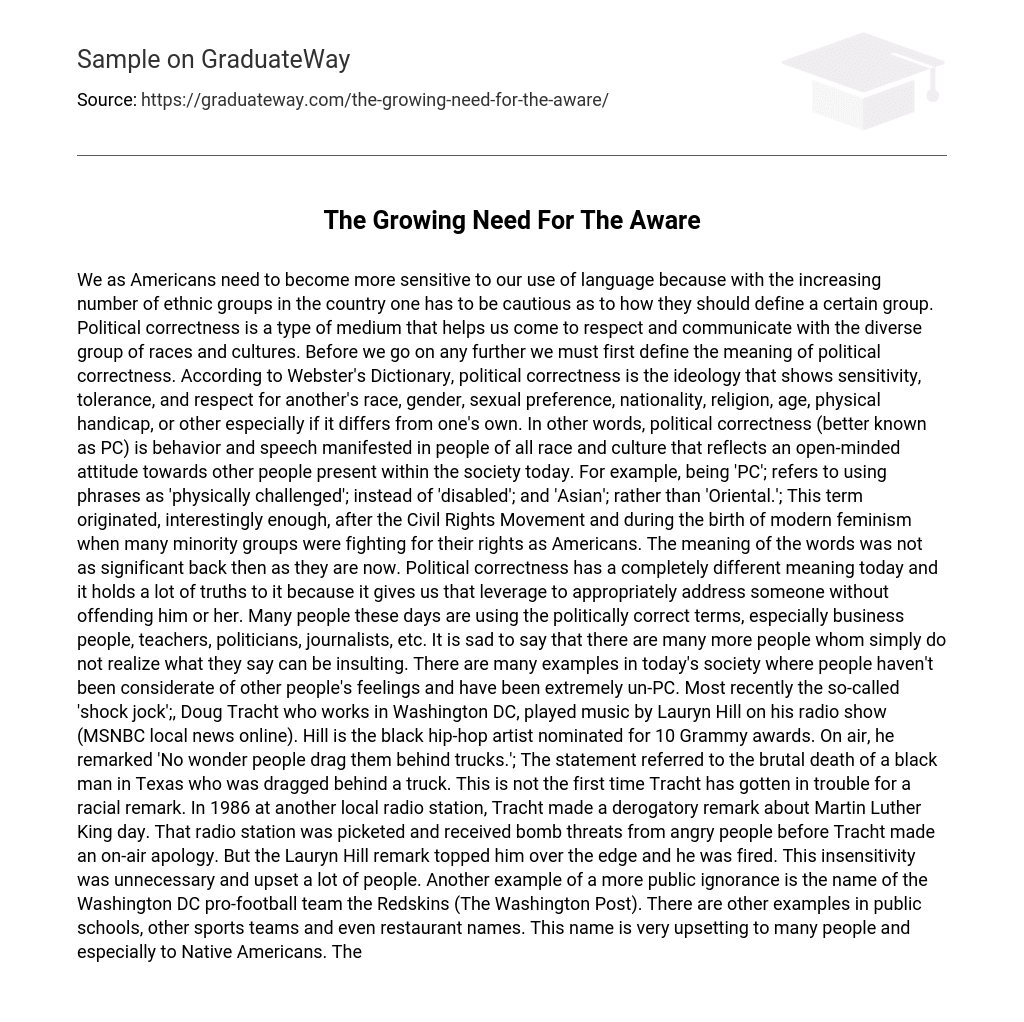The United States’ growing number of ethnic groups highlights the importance for Americans to be more mindful of their language choices. Political correctness serves as a means for us to demonstrate respect and effectively communicate with the diverse range of races and cultures in our society. According to Webster’s Dictionary, political correctness is an ideology that promotes sensitivity, tolerance, and respect towards individuals who differ from oneself in terms of race, gender, sexual preferences, nationality, religion, age, physical handicaps or any other traits. In simpler terms, being politically correct involves behavior and speech that display an open-minded attitude towards others today. This term emerged after the Civil Rights Movement and during the rise of modern feminism when minority groups were advocating for their rights. The significance of words was not as important back then compared to now. Nowadays, political correctness has a distinct meaning and multiple truths as it allows us to address individuals appropriately without causing offense. Many professionals in business, education politics and journalism now utilize politically correct language; however there are still many individuals in our society who are unaware and can be insulting. There have been numerous instances where people have shown insensitivity by disregarding others’ feelings.One recent example is Doug Tracht, also known as the ‘shock jock’, who played music by black hip-hop artist Lauryn Hill on his radio show. During the broadcast, he made a comment about the brutal death of a black man in Texas: ‘No wonder people drag them behind trucks.’ Tracht had previously faced criticism for derogatory remarks about Martin Luther King Day in 1986. As a consequence of his insensitive remark about Hill, he was ultimately fired from his position. This incident was unnecessary and deeply upset many individuals.
Another instance of public ignorance is the name of the Washington DC pro-football team – Redskins. The Native American name that has caused controversy in public schools, sports teams, and restaurant names is offensive. Despite protests for change, the mascot remains unchanged in Washington DC, reflecting a lack of political correctness. This failure reflects poorly on our own capitol and leaves us feeling embarrassed. Using such a name can be seen as a hate crime and should be avoided in various settings including businesses, schools, universities, firms, and sports.
Political correctness is crucial to avoid being perceived as unprofessional or bigoted. The use of derogatory terms historically used to oppress certain communities undermines and shows hostility towards the black community
The Significance of the Word ‘Nigger’ in Promoting Inclusivity or Perpetuating Discrimination
The word ‘nigger’ holds immense complexity and emotional charge within American language. While it can be used among black individuals as a form of camaraderie, its usage by white individuals as a racist epithet is deeply offensive. This offense stems from its association with slavery, struggles during the Civil Rights Movement, ongoing racism, and the hatred that still persists today. It serves as a painful reminder of the suffering endured by their ancestors in their fight for freedom.
However, some black individuals have reclaimed this term through various forms of artistic expression such as poetry, rap lyrics, and comedy routines. Through these mediums, they strive to strip away its offensive connotations and use it in an acceptable or affectionate manner similar to terms like ‘my friend’ or ‘my brother’.
Nevertheless, there are those who argue against political correctness and question why self-respecting black people can freely use this term while others cannot. However, considering the historical context of forced transportation and enslavement of native Africans by white individuals on plantations worldwide, it is highly unlikely that any mentally stable black individual would willingly accept being referred to as a ‘nigger’ by someone from another race.
Those who resist change often cause harm instead of being harmed themselves. Oppressing black individuals and using derogatory language is akin to treating them as slaves once again. It is important to recognize the benefits of political correctness, such as promoting a more civilized society by eliminating bias in language. However, critics argue that PC phrases can be unfamiliar, lengthy, and ambiguous, making their implementation challenging and requiring more effort in selecting appropriate expressions. They also claim that enforcing political correctness encroaches upon freedom of speech protected by the First Amendment. Nevertheless, these critics must adapt and understand that although using certain words may be more complex, it can help preserve someone’s dignity. Ultimately, determining which justification carries more weight is crucial.
Political correctness should be embraced globally to create a more content and courteous society, where racial boundaries are respected and an ideal utopian coexistence can be achieved (Atwan, Robert, ed. America Now: 3rd edition. Bedford: Boston Books: 1999. (Currie, Bennie M. ‘The N-Word and How to Use It’; The Chicago Reader, Dec 19,1997)).
Beckwith, Francis J. and Michael E. Bauman wrote a book titled “Are You Politically Correct?: Debating America’s Cultural Standards” in 1993, published by Prometheus Books in Buffalo, N.Y.
‘Censorship vs. Freedom of Speech’. Visit the website http://www.cs.nott.ac.uk/axs96m/pqi/argumenta.html for more information (accessed on 12 Feb 1999).
The Greaseman was fired due to a racist remark. You can read more about it at http://www.msnbc.com/local/WRC/224250.asp#BODY, the article was published on February 24, 1999.
According to an article by Sue Anne Pressley titled ‘Use of Indian Mascot Brings Justice Dept. to N.C. Town’ in the Washington Post on February 17, 1999, a North Carolina town is facing intervention from the Justice Department due to its use of an Indian mascot.
Webster’s Dictionary, 1998 edition.
‘What is Political Correctness?’. http://www.cs.cott.ac.uk/axs96m/pqi/whatis.html (12 Feb 1999).





